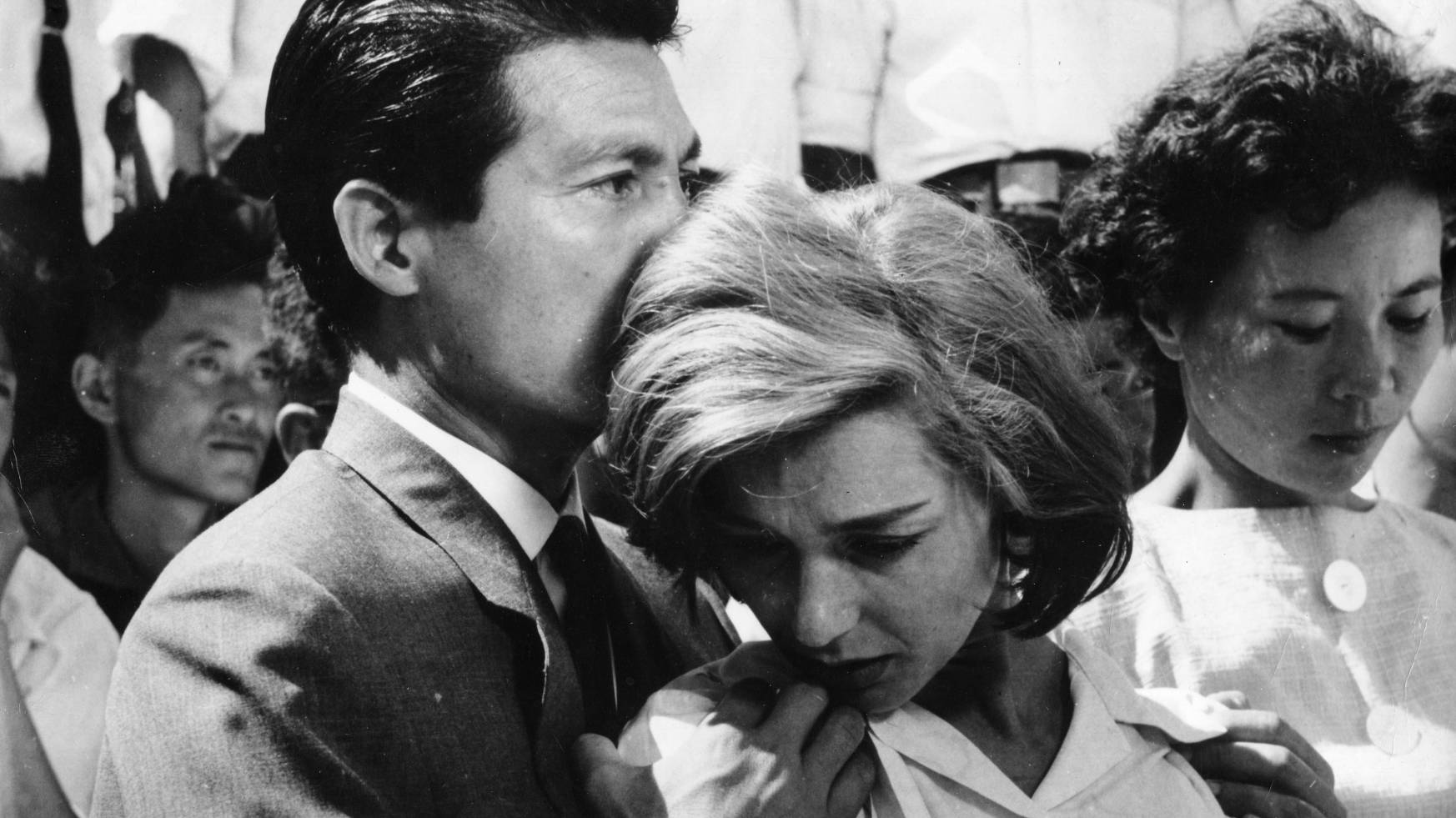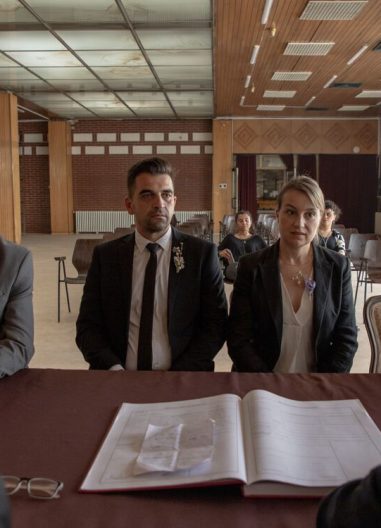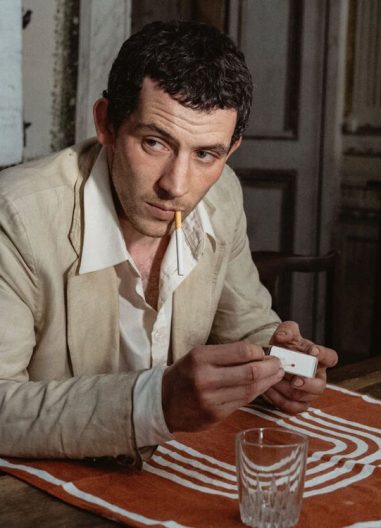Hiroshima mon amour
Een Franse vrouw (Emmanuelle Riva) en een Japanse man (Eiji Okada) hebben een korte, intense romance in Hiroshima. Zij is naar Japan gekomen om in een film over vrede te spelen; hij werkt als architect en zijn vrouw is de stad uit. In de diepe gesprekken die ze voeren strengelen de verhalen van de protagonisten ineen met hun gedachten aan de door de atoombom verwoeste stad.
De eerste speelfilm van Alain Resnais is een van de meest invloedrijke werken in de geschiedenis van film. Het script werd geschreven door Magritte Duras, ook toen al een gevierd romancier. Ze schreef het verhaal in twee maanden en werkte daarbij nauw samen met de regisseur. Tijd, herinneringen en affect zijn terugkerende thema’s in Resnais’ gehele oeuvre. Persoonlijk herinneringen en historische herinneringen zijn voor hem onafscheidelijk.
Hoewel de film om diplomatieke redenen – waarschijnlijk om de Verenigde Staten niet te beledigen – buiten de competitie in première ging in Cannes, won de film The International Critics Award en werd later genomineerd voor een Oscar beste scenario waardoor Rensais internationaal bekendheid verwierf. Bovendien veranderde de film de filmcultuur en werd Resnais een pionier van de Franse Nouvelle Vague. Met de mix van realiteit en fantasie, documentaire beelden en fictieve flashbacks creëerde Resnais een niet-lineair opgebouwde film, voorheen alleen bekend in de literatuur. Het maakte Hiroshima Mon Amour het ultieme liefdeskind van een schrijfster en een filmmaker.
A French woman (Emmanuelle Riva) and a Japanese man (Eiji Okada) engage in a brief, intense romance in Hiroshima. She has come to Japan to star in a film about peace; he is an architect whose wife is out of town. In a series of deep conversations the two protagonists intertwine their stories with pondering the devastation wrought by the atomic bomb dropped on the city.
The first feature film of Alain Resnais is one of the most influential works in the history of cinema. The script of Hiroshima Mon Amour was written by Magritte Duras – at that time already an acclaimed novelist. She wrote the scenario in two months while working closely with the director. Time, memory and affect are recurring themes in Resnais’ entire oeuvre. Personal memory and historical memory to him are inseparable.
Although the film premiered outside of the main competition in Cannes for ‘diplomatic reasons’ – presumably not to offend the U.S – it won the International Critics Award and later gained an Oscar nomination for Best Scenario, establishing Resnais international reputation.
Moreover, the film changed the cinematic culture and became a pioneer of the French New Wave. With its mixture of reality and fantasy, documentary images and fictional flashbacks, Resnais created a non-linear fragmented storyline, formerly only known in literature, making the film a true love-child of a filmmaker and a novelist.
Kies tijdstip
- filmspecial
Een Franse vrouw (Emmanuelle Riva) en een Japanse man (Eiji Okada) hebben een korte, intense romance in Hiroshima. Zij is naar Japan gekomen om in een film over vrede te spelen; hij werkt als architect en zijn vrouw is de stad uit. In de diepe gesprekken die ze voeren strengelen de verhalen van de protagonisten ineen met hun gedachten aan de door de atoombom verwoeste stad.
De eerste speelfilm van Alain Resnais is een van de meest invloedrijke werken in de geschiedenis van film. Het script werd geschreven door Magritte Duras, ook toen al een gevierd romancier. Ze schreef het verhaal in twee maanden en werkte daarbij nauw samen met de regisseur. Tijd, herinneringen en affect zijn terugkerende thema’s in Resnais’ gehele oeuvre. Persoonlijk herinneringen en historische herinneringen zijn voor hem onafscheidelijk.
Hoewel de film om diplomatieke redenen – waarschijnlijk om de Verenigde Staten niet te beledigen – buiten de competitie in première ging in Cannes, won de film The International Critics Award en werd later genomineerd voor een Oscar beste scenario waardoor Rensais internationaal bekendheid verwierf. Bovendien veranderde de film de filmcultuur en werd Resnais een pionier van de Franse Nouvelle Vague. Met de mix van realiteit en fantasie, documentaire beelden en fictieve flashbacks creëerde Resnais een niet-lineair opgebouwde film, voorheen alleen bekend in de literatuur. Het maakte Hiroshima Mon Amour het ultieme liefdeskind van een schrijfster en een filmmaker.
A French woman (Emmanuelle Riva) and a Japanese man (Eiji Okada) engage in a brief, intense romance in Hiroshima. She has come to Japan to star in a film about peace; he is an architect whose wife is out of town. In a series of deep conversations the two protagonists intertwine their stories with pondering the devastation wrought by the atomic bomb dropped on the city.
The first feature film of Alain Resnais is one of the most influential works in the history of cinema. The script of Hiroshima Mon Amour was written by Magritte Duras – at that time already an acclaimed novelist. She wrote the scenario in two months while working closely with the director. Time, memory and affect are recurring themes in Resnais’ entire oeuvre. Personal memory and historical memory to him are inseparable.
Although the film premiered outside of the main competition in Cannes for ‘diplomatic reasons’ – presumably not to offend the U.S – it won the International Critics Award and later gained an Oscar nomination for Best Scenario, establishing Resnais international reputation.
Moreover, the film changed the cinematic culture and became a pioneer of the French New Wave. With its mixture of reality and fantasy, documentary images and fictional flashbacks, Resnais created a non-linear fragmented storyline, formerly only known in literature, making the film a true love-child of a filmmaker and a novelist.












